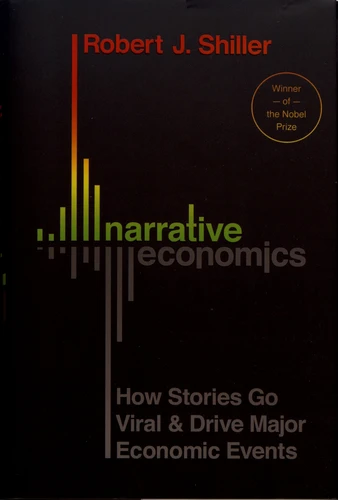Prix Nobel dEconomie
Narrative Economics. How Stories Go Viral and Drive Major Economic Events
Par :Formats :
Définitivement indisponible
Cet article ne peut plus être commandé sur notre site (ouvrage épuisé ou plus commercialisé). Il se peut néanmoins que l'éditeur imprime une nouvelle édition de cet ouvrage à l'avenir. Nous vous invitons donc à revenir périodiquement sur notre site.
- Paiement en ligne :
- Livraison à domicile ou en point Mondial Relay indisponible
- Retrait Click and Collect en magasin gratuit
- Réservation en ligne avec paiement en magasin :
- Indisponible pour réserver et payer en magasin
- Nombre de pages377
- PrésentationRelié
- FormatGrand Format
- Poids0.723 kg
- Dimensions15,9 cm × 24,1 cm × 3,5 cm
- ISBN978-0-691-18229-2
- EAN9780691182292
- Date de parution01/10/2019
- ÉditeurPrinceton University Press
Résumé
In a world in which Internet troll farms attempt to influence foreign elections, can we afford to ignore the power of viral stories to affect economies ? In this groundbreaking book, Nobel Prize-winning economist and New York Times bestselling author Robert Shiller offers a new way to think about the economy and economic change. Using a rich array of historical examples and data, Shiller argues that studying popular stories that affect individual and collective economic behavior-what he calls "narrative economics"- has the potential to vastly improve our ability to predict, prepare for, and lessen the damage of financial crises, recessions, depressions, and other major economic events.
Spread through the public in the form of popular stories, ideas can go viral and move markets-whether it's the belief that tech stocks can only go up, that housing prices never fall, or that some firms are too big to fail. Whether true or false, stories like these-transmitted by word of mouth, by the news media, and increasingly by social media-drive the economy by driving our decisions about how and where to invest, how much to spend and save, and more.
But despite the obvious importance of such stories, most economists have paid little attention to them.
Spread through the public in the form of popular stories, ideas can go viral and move markets-whether it's the belief that tech stocks can only go up, that housing prices never fall, or that some firms are too big to fail. Whether true or false, stories like these-transmitted by word of mouth, by the news media, and increasingly by social media-drive the economy by driving our decisions about how and where to invest, how much to spend and save, and more.
But despite the obvious importance of such stories, most economists have paid little attention to them.
In a world in which Internet troll farms attempt to influence foreign elections, can we afford to ignore the power of viral stories to affect economies ? In this groundbreaking book, Nobel Prize-winning economist and New York Times bestselling author Robert Shiller offers a new way to think about the economy and economic change. Using a rich array of historical examples and data, Shiller argues that studying popular stories that affect individual and collective economic behavior-what he calls "narrative economics"- has the potential to vastly improve our ability to predict, prepare for, and lessen the damage of financial crises, recessions, depressions, and other major economic events.
Spread through the public in the form of popular stories, ideas can go viral and move markets-whether it's the belief that tech stocks can only go up, that housing prices never fall, or that some firms are too big to fail. Whether true or false, stories like these-transmitted by word of mouth, by the news media, and increasingly by social media-drive the economy by driving our decisions about how and where to invest, how much to spend and save, and more.
But despite the obvious importance of such stories, most economists have paid little attention to them.
Spread through the public in the form of popular stories, ideas can go viral and move markets-whether it's the belief that tech stocks can only go up, that housing prices never fall, or that some firms are too big to fail. Whether true or false, stories like these-transmitted by word of mouth, by the news media, and increasingly by social media-drive the economy by driving our decisions about how and where to invest, how much to spend and save, and more.
But despite the obvious importance of such stories, most economists have paid little attention to them.






